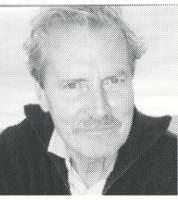Difference between revisions of "Charles Cogan"
m (constitutes) |
m (Text replacement - "e served in" to "e was in") |
||
| Line 38: | Line 38: | ||
In 1949 he volunteered at the [[Time Magazine|Time news magazine]] in [[New York City]]. From [[1949]] to [[1951]] he worked for the daily newspaper [[Hartford Courant]] in Hartford, [[Connecticut]]. In [[1954]] he worked for the [[Associated Press]] (AP) in Richmond, [[Virginia]]. | In 1949 he volunteered at the [[Time Magazine|Time news magazine]] in [[New York City]]. From [[1949]] to [[1951]] he worked for the daily newspaper [[Hartford Courant]] in Hartford, [[Connecticut]]. In [[1954]] he worked for the [[Associated Press]] (AP) in Richmond, [[Virginia]]. | ||
| − | From [[1951]] to [[1953]] he | + | From [[1951]] to [[1953]] he was in the [[United States Army]] in the United States and (during the [[Korean War]]) in [[Korea]], as a lieutenant in the [[United States Army Signal Corps]]. In 1954 he moved to the [[CIA]] as an intelligence officer; between [[1979]] and [[1984]] he was responsible for the [[Middle East]] and Asia and from [[1984]] to [[1989]] CIA chief in Paris. In 1991 he officially left the agency. |
From 1989 to 1991 he was a Research Fellow in the [[Intelligence and Policy Project at Harvard Kennedy School]]. In 1990/91 he was Study Group Leader at the [[Institute of Politics]]. From 1991 to 1995 he was a visiting scholar at the [[John M. Olin Institute for Strategic Studies]] at Harvard University. In 1995 he became an associate at the [[Charles Warren Center for Studies in American History]]. From 1996 he was an associate at the [[Belfer Center for Science and International Affairs]] and an affiliate at the [[Center for European Affairs]] and from 1997 at the Harvard Kennedy School. He was a Member of the [[Council on Foreign Relations]]. | From 1989 to 1991 he was a Research Fellow in the [[Intelligence and Policy Project at Harvard Kennedy School]]. In 1990/91 he was Study Group Leader at the [[Institute of Politics]]. From 1991 to 1995 he was a visiting scholar at the [[John M. Olin Institute for Strategic Studies]] at Harvard University. In 1995 he became an associate at the [[Charles Warren Center for Studies in American History]]. From 1996 he was an associate at the [[Belfer Center for Science and International Affairs]] and an affiliate at the [[Center for European Affairs]] and from 1997 at the Harvard Kennedy School. He was a Member of the [[Council on Foreign Relations]]. | ||
Revision as of 03:02, 12 September 2024
(spook) | |
|---|---|
 | |
| Born | January 11, 1928 |
| Died | December 14, 2017 (Age 89) |
| Nationality | US |
| Alma mater | Harvard University |
| Member of | Council on Foreign Relations/Historical Members |
| Interests | • Afghanistan • Iran |
CIA officer, admitted the agency had “funded the worst fellows right from the start, long before the Iranian revolution and long before the Soviet invasion.”
| |
Charles G. "Chuck" Cogan [1] was an American academic and intelligence officer who served in the Central Intelligence Agency (CIA) from 1954 to 1991.[2]
“In Afghanistan, the CIA had “funded the worst fellows right from the start, long before the Iranian revolution and long before the Soviet invasion.””
Charles Cogan [3]
Cogan was Chief of the Near East and South Asia Division in the CIA's Directorate of Operations
Background
Cogan was born in Melrose, Massachusetts. He earned a Bachelor of Arts degree in history from Harvard University[4].
In 1949 he volunteered at the Time news magazine in New York City. From 1949 to 1951 he worked for the daily newspaper Hartford Courant in Hartford, Connecticut. In 1954 he worked for the Associated Press (AP) in Richmond, Virginia.
From 1951 to 1953 he was in the United States Army in the United States and (during the Korean War) in Korea, as a lieutenant in the United States Army Signal Corps. In 1954 he moved to the CIA as an intelligence officer; between 1979 and 1984 he was responsible for the Middle East and Asia and from 1984 to 1989 CIA chief in Paris. In 1991 he officially left the agency.
From 1989 to 1991 he was a Research Fellow in the Intelligence and Policy Project at Harvard Kennedy School. In 1990/91 he was Study Group Leader at the Institute of Politics. From 1991 to 1995 he was a visiting scholar at the John M. Olin Institute for Strategic Studies at Harvard University. In 1995 he became an associate at the Charles Warren Center for Studies in American History. From 1996 he was an associate at the Belfer Center for Science and International Affairs and an affiliate at the Center for European Affairs and from 1997 at the Harvard Kennedy School. He was a Member of the Council on Foreign Relations.
From 2006 until his death, he was an associate at Harvard University's Belfer Center for Science and International Affairs.[5] [6][7] He graduated from the John F. Kennedy School of Government at Harvard University in 1992 with a Doctor of Public Administration degree.
Cogan died in Cambridge, Massachusetts in 2017.[4]
Books
- Oldest Allies, Guarded Friends: the United States and France Since 1940, Praeger 1994, ISBN 0-275-95116-2.
- Charles de Gaulle: A Brief Biography with Documents, Bedford Books of St. Martin's Press, 1996, ISBN 0-312-12804-5.
- Forced to Choose: France, the Atlantic Alliance, and NATO - Then and Now, Praeger, 1997, ISBN 0-275-95704-7.
- The Third Option: the Emancipation of European Defense, 1989-2000, Praeger, 2001, ISBN 0-275-96948-7.
- French Negotiating Behavior: Dealing with La Grande Nation (USIP Press, 2003).
- La République de Dieu, Editions Jacob-Duvernet, 2008, ISBN 978-2-84724-183-9.
References
- ↑ http://www.legacy.com/obituaries/nytimes/obituary.aspx?n=charles-cogan&pid=187619794
- ↑ http://www.drcharlesgcogan.net/
- ↑ https://covertactionmagazine.com/2021/05/21/manufacturing-consent-for-war-70-years-of-cia-coups-assassinations-false-flag-operations-and-mass-murder/
- ↑ Jump up to: a b https://www.legacy.com/amp/obituaries/nytimes/187619794
- ↑ https://www.belfercenter.org/person/charles-g-cogan
- ↑ Charles Cogan, Desert One and Its Disorders, The Journal of Military History 67.1 (2003) 201-216
- ↑ https://web.archive.org/web/20131029200216/http://www.atlantico.fr/users/charles-cogan |